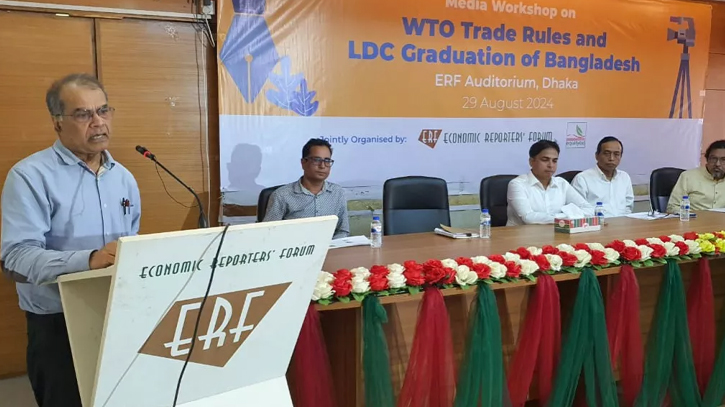
Photo : Collected
Civil society members and economic journalists expressed concerns about discrepancies in Bangladesh’s national data as the country prepares for upcoming negotiations at the World Trade Organization (WTO). This issue was discussed during a media workshop titled “WTO Trade Rules and LDC Graduation of Bangladesh,” held in Dhaka on Thursday.
The workshop was jointly organized by EquityBD and the Economic Reporters’ Forum (ERF), chaired by the forum’s President Refayet Ullah Mirdha of The Daily Star, and moderated by Abul Kashem, General Secretary of ERF. Over 50 economic journalists from various news outlets in Bangladesh participated in the event.
Hafizur Rahman, Additional Secretary and former Director General of the WTO Cell, was the keynote speaker, while Rezaul Karim Chowdhury, Chief Moderator of EquityBD, delivered the welcome address. Barkat Ullah Maruf of the COAST Foundation presented a detailed overview of various WTO agreements.
In his welcome speech, Rezaul Karim Chowdhury highlighted EquityBD and COAST Foundation’s long-standing involvement with WTO issues, dating back to 2005. He reiterated their demand for establishing a dedicated WTO Cell under the Commerce Ministry to effectively monitor WTO matters and enhance Bangladesh’s negotiation capacity.
Barkat Ullah Maruf, in his keynote presentation, stressed the need for a national strategy based on accurate data and benefit calculations before Bangladesh graduates from the Least Developed Country (LDC) category. There are data discrepancies arising from hasty political ambitions, and this could undermine Bangladesh’s negotiation positions in sectors such as agriculture and fisheries, he warned.
Hafizur Rahman, speaking as an expert, pointed out the dual benefits of Bangladesh’s potential LDC graduation. “We will benefit if we graduate, as it will enhance our ability to compete openly with developed and developing countries. However, delaying graduation for a few years would allow us to continue enjoying the special provisions available to LDCs. We need to decide which path to take,” he said.
In his closing remarks, Refayet Ullah Mirdha, President of ERF, suggested that Bangladesh should consider delaying its LDC graduation for at least another decade to thoroughly review national data and better prepare for future challenges.
Abul Kashem, General Secretary of ERF and the session’s moderator, encouraged economic reporters to deepen their understanding of WTO rules and to produce informed reports that would contribute to Bangladesh’s development.
Messenger/Sajib








